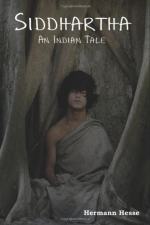Govinda listened silently.
“Why have you told me this about the stone?” he asked hesitantly after a pause.
“I did it without any specific intention. Or perhaps what I meant was, that love this very stone, and the river, and all these things we are looking at and from which we can learn. I can love a stone, Govinda, and also a tree or a piece of bark. This are things, and things can be loved. But I cannot love words. Therefore, teachings are no good for me, they have no hardness, no softness, no colours, no edges, no smell, no taste, they have nothing but words. Perhaps it are these which keep you from finding peace, perhaps it are the many words. Because salvation and virtue as well, Sansara and Nirvana as well, are mere words, Govinda. There is no thing which would be Nirvana; there is just the word Nirvana.”
Quoth Govinda: “Not just a word, my friend, is Nirvana. It is a thought.”
Siddhartha continued: “A thought, it might be so. I must confess to you, my dear: I don’t differentiate much between thoughts and words. To be honest, I also have no high opinion of thoughts. I have a better opinion of things. Here on this ferry-boat, for instance, a man has been my predecessor and teacher, a holy man, who has for many years simply believed in the river, nothing else. He had noticed that the river’s spoke to him, he learned from it, it educated and taught him, the river seemed to be a god to him, for many years he did not know that every wind, every cloud, every bird, every beetle was just as divine and knows just as much and can teach just as much as the worshipped river. But when this holy man went into the forests, he knew everything, knew more than you and me, without teachers, without books, only because he had believed in the river.”
Govinda said: “But is that what you call `things’, actually something real, something which has existence? Isn’t it just a deception of the Maja, just an image and illusion? Your stone, your tree, your river— are they actually a reality?”




